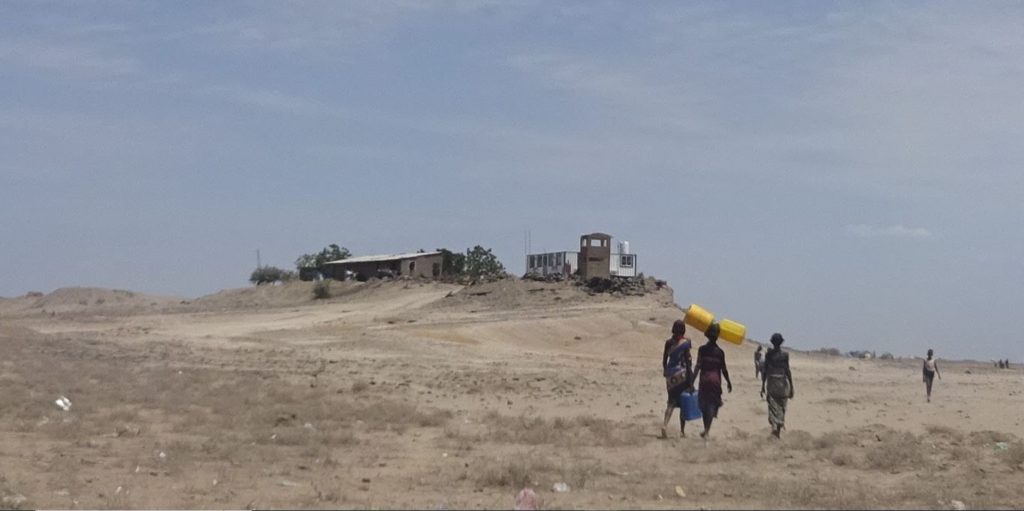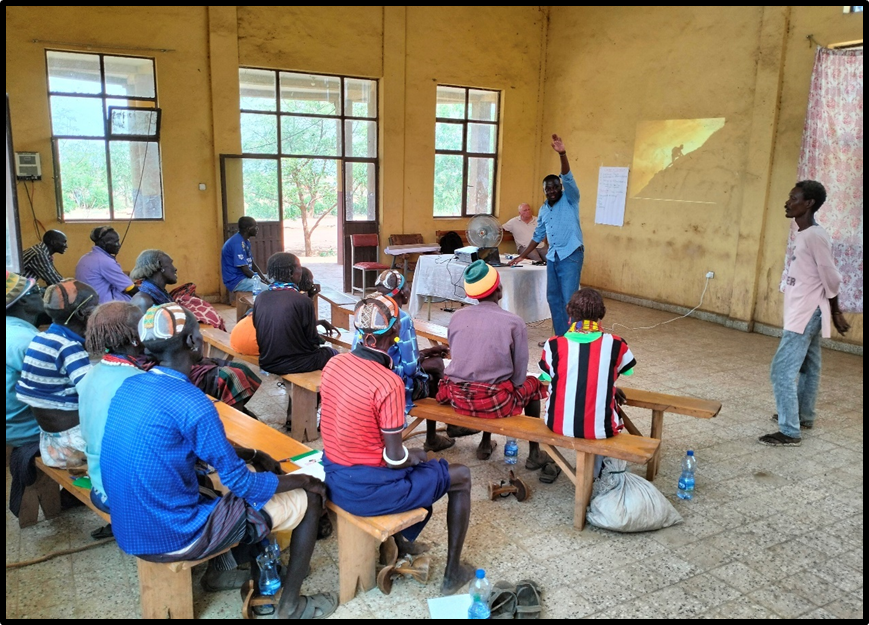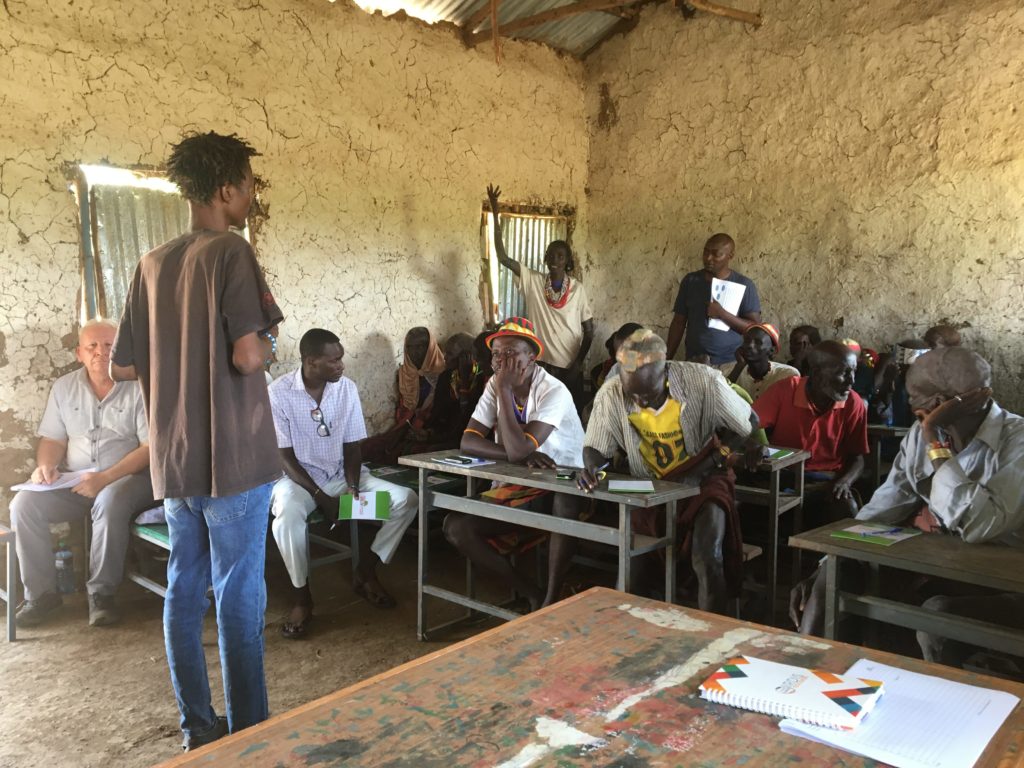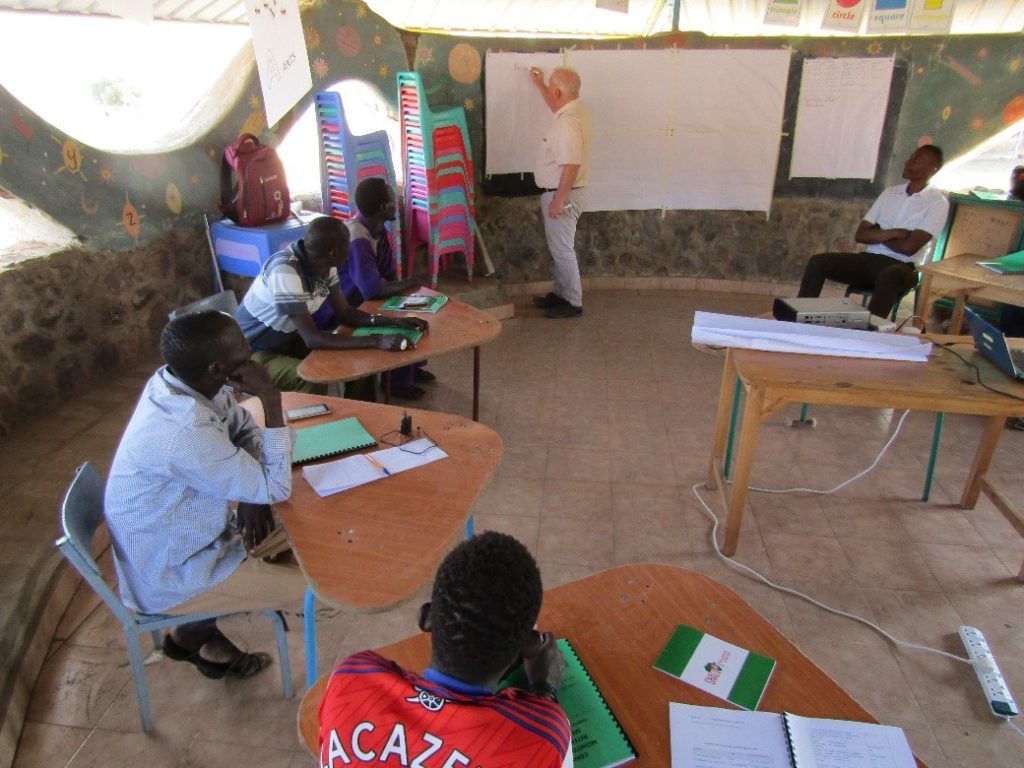By: Moses Osiro MA, & Austin Ngacha Macharia MA.
“Our understanding of conflict here in Omorate is livestock theft and fighting for water and grass, more so now that there’s an ongoing and devastating drought. We’ve lost so many people due to this conflict but all we would like is for peace to prevail and the institutional support to stabilize it. With Shalom-SCCRR’s help, we are now going deeper to understanding the underlying causes of conflict and underdevelopment.” Mure Lokomoy, Shalom-SCCRR Community Facilitator, Sies, Omorate, Ilemi Triangle

Bordering South Sudan, Ethiopia and Kenya, the Ilemi Triangle is a unique region which interfaces three East African countries. The uniqueness of Ilemi isn’t only limited to its geographical location, but also the nature of conflict within communities inhabiting the area. In the region, are the Toposa community from South Sudan, Turkana community from Kenya and the Daasanach & Nyangatom communities from Ethiopia. Shalom-SCCRR has learnt that between the Turkana and Daasanach communities, there exists a lot of conflict; a conflict which appears local, but is international due to the conflict spill-over effect and administrative origin of the two communities.

Owing to their nomadic nature, both these communities are in conflict over, inter-alia, livestock as well as stiff competition for water and pasture, as well as border disputes. Be that as it may, deeper and more underlying causes adversely contribute towards the inter-communal conflict. From a research perspective, the causes are derived from empirical evidences stemming from the three analytical paradigms of conflict analysis, namely the Strategists (use of force or power), Peace Research (structures and institutions) and Conflict Research (environment) paradigms. These paradigms provide lenses through which the root causes of conflict can be identified. When compounded within themselves, these underlying causes aggravate the conflict. It is therefore imperative to recognize, gain a better and crystallized understanding of the different intricate dynamics of this conflict, for which conflict paradigms play a key role. The conflict causes in turn determine the most strategic intervention approach to effectively address the conflict. Based on the findings provided by both communities through the conflict paradigms, Shalom-SCCRR has strategically adopted ‘Conflict Transformation’ intervention approaches to the conflict context.

Conflict Transformation, which is relationship-centric, encompasses moving from the unwanted past and present to the desired future. The process is basically skewed towards change; a change which requires analyzing the present situation, the horizon of preferred future and the prerequisite development of change processes. Within this context, Shalom-SCCRR has been engaging the Daasanach and Turkana communities to examine the conflict situation between them, determine the desired future, then develop the change processes necessary to achieve that future. In this regard, Shalom-SCCRR has been engaging with Turkana and Daasanach grassroots community leaders and key opinion stakeholders in Ilemi Triangle, in an effort to increase knowledge and awareness, as well as develop the required skills and institutions necessary in instigating a change in the trajectory of the conflict. The ongoing training workshops serve as excellent fora through which the community resources persons develop a better understanding about how to analyze the causes of conflict, conflict management and peacebuilding.
“We’d like to thank Shalom-SCCRR for the excellent trainings on conflict management and peacebuilding in our area. Through its teachings and trainings, we’re increasingly getting aware, building our conflict handling skills and seeing the value of making peace between the Daasanach and Turkana communities in the Ilemi Triangle. As such, we’ll endeavor to put more emphasis on identifying and uprooting the root causes of this inter-communal conflict as well as pursuing alternative ways of resolving this protracted conflict.” Francis Ekiru, Shalom-SCCRR Community Animator, Ilemi Triangle, at the Kenya-Ethiopia-South Sudan border interface.

While also serving as an excellent forum for engaging key community stakeholders from both communities, the training workshops serve as a channel through which Shalom-SCCRR draws the main issues and lessons of the conflict, as presented by the communities. One of Shalom-SCCRR’s main criteria in conducting transformative intervention strategies is that each strategy is data driven. Therefore, strategies are developed from data received from the community. Such data-centered strategies have proven successful in their application and Shalom-SCCRR continues to reaffirm its commitment to pursuing peacebuilding in the region via continuous engagement with both communities. Shalom-SCCRR, through its highly qualified team members, remain committed to the cause. Through the generous and much-needed support from donors, Shalom-SCCRR continues to conduct training workshops in the area in order to rebuild and bolster relationships between the Turkana and Daasanach communities while also serving to bridge the institutional underdevelopment gap which is blatantly lacking in the region.
By:
Moses Osiro MA, Shalom-SCCRR Project Assistant
Austin Ngacha Macharia MA, Shalom-SCCRR Project Officer; Ilemi Triangle and Turkana-West Pokot Projects
Relevant Links
2022 SHALOM-SCCRR RESULTS AND ACHIEVEMENTS https://shalomconflictcenter.org/2022-shalom-sccrr-results-and-achievements-2/
Shalom-SCCRR. (2022). 2009-2021 Shalom-SCCRR Results and Achievements. https://shalomconflictcenter.org/2009-2021-shalom-sccrr-results-and-achievements/
Prof. Wanakayi K. O. (2020). An understanding of the work of Shalom-SCCRR: https://shalomconflictcenter.org/wp-content/uploads/2021/02/AN-UNDERSTANDING-OF-THE-WORK-OF-SHALOM-SCCRR.pdf
Shalom-SCCRR. (2022). 2021 Shalom -SCCRR Results and Achievements. https://shalomconflictcenter.org/2021-shalom-sccrr-results-achievements/
Moran, M. (2020). Eastern Africa: Shalom-SCCRR receives United Nations (UN) Accreditation. https://shalomconflictcenter.org/3901-2/
The Peace Dialogue, Issue No. 19, Hekima Institute of Peace Studies and International Relations (HIPSIR): TURKANA-DASSANECH CONFLICT: CAUSES AND CONSEQUENCES http://hipsir.hekima.ac.ke/wp-content/uploads/2021/12/Peace-Dialogue-Issue-19.pdf
Devine, P., (2009). Turkana – Dassanech conflict: Causes and Consequences. (Unpublished Master’s dissertation). Hekima Institute of Peace Studies and International Relations (HIPSIR), Catholic University of Eastern Africa, Nairobi, Kenya. Available at: https://shalomconflictcenter.org/wp-content/uploads/2021/01/TURKANA-DASSENACH-CONFLICT_CAUSES-AND-CONSEQUENCES.pdf
Devine, P. R. (2022). Conflict Transformation and Peace-Building across Eastern Africa: Chairman’s Report on Progress in 2021. https://shalomconflictcenter.org/conflict-transformation-and-peace-building-across-eastern-africa-chairmans-report-on-progress-in-2021/
Macharia, A. & Awed, A. (2021). Lazarus Epae Ereng (Assistant Chief, Nachukui-Turkana County) Attest to Shalom-SCCRR’s Impact & Peacebuilding Dividends along the Kenya-Ethiopian border. https://shalomconflictcenter.org/lazarus-epae-ereng-assistant-chief-nachukui-turkana-county-attests-to-shaloms-impact-peacebuilding-dividents-along-the-kenya-ethiopia-border/
Haskin, C. (2009). The Ilemi Triangle: A Forgotten Conflict.https://shalomconflictcenter.org/wp-content/uploads/2021/02/THE-ILEMI-TRIANGLE_-A-FORGOTTEN-CONFLICT-CHARLES-HASKINS_-2009.pdf
Macharia, A. (2020).Briefing Paper No. 2:An Analysis of Turkana Dassenach conflict; Diminishing Role of Traditional Mechanisms in the Management of Pastoralist Conflict. https://shalomconflictcenter.org/briefing-paper-no-2-an-analysis-of-turkana-dassenach-conflict/
Erot. P. (2020). Briefing Paper No. 11: Climate Change, Lake Turkana and Inter-Communal Conflicts in the Ilemi Triangle Region. https://shalomconflictcenter.org/briefing-paper-no-11/
Macharia, A. (2019). Shalom-SCCRR’s Conflict Research in the Ilemi Triangle; To Empower the Local Ethnic Groups to be the Architects of their Interdependent Future. https://shalomconflictcenter.org/shaloms-sccrr-conflict-research-in-the-iemi-triangle-to-empower-the-local-ethnic-groups-to-be-the-architects-of-their-interdependent-future/
Mwangi, F. (2019). The Ilemi Triangle’; Shalom-SCCRR’s Conflict Pre-Assessments with Cross-Border Communities. https://shalomconflictcenter.org/the-ilemi-triangle-shalom-sccrrs-conflict-pre-assessments-with-cross-border-communities/
CONNECT WITH US

